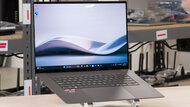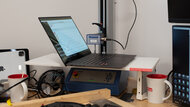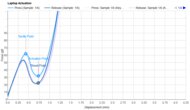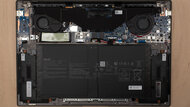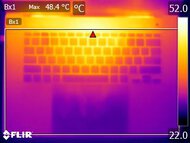Shopping for a laptop can be daunting. Over a dozen major manufacturers release new models every year. While some companies are more reputable for producing higher-quality products, even the best laptop brands sometimes release models with design flaws or too many compromises. Also, there are often complaints of poor quality control, inadequate after-sales customer support, and other issues associated with a particular manufacturer. As you may have guessed, there isn't really a best laptop brand, as it depends entirely on your needs and preferences, though quite a few, like Apple, ASUS, Dell, and Microsoft, stand out.
We've bought and tested over 165 laptops, including models from over a dozen brands, and below are our recommendations for the best brands for laptops. The order in which these laptops appear in the article doesn't represent any ranking; they're listed alphabetically. For more options, check out our recommendations for the best laptops, the best business laptops, and the best gaming laptops. If you want to learn more about how we test laptops or our review process, check out this article, where we give you a quick rundown of each step from the moment we purchase the laptop to the final published review.
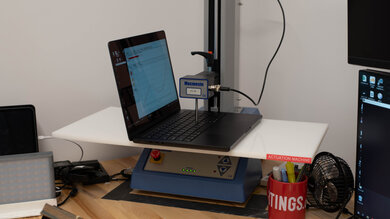
Since 2021, we've tested dozens of laptops every year. We buy our laptops to avoid biases, and following a rigorous methodology, we test nearly every part of the laptop so that we can deliver results you can rely on. We use a wide range of equipment to perform our tests, including a colorimeter, a Mecmesin MultiTest-i System Test Stand, and various performance benchmarking suites.
Want to know more? Check out our How We Test Laptops article, where we give you a broader overview of our review process, from the moment we purchase the product to the final review.
-
Acer
 General Productivity7.9Multimedia8.5Gaming5.1Workstation6.7Size:14"See all our test resultsOperating System:Windows 11
General Productivity7.9Multimedia8.5Gaming5.1Workstation6.7Size:14"See all our test resultsOperating System:Windows 11Acer, a Taiwanese company, was founded in 1976 as Multitech and later renamed Acer in 1987. Despite its long-term reputation for making affordable, budget laptops, the company currently has one of the widest selections of models, with multiple laptop lineups like the productivity-focused Aspire and Swift, the gaming Nitro and Predator lines, the creation-geared Concept lineup, and more. Acer is also one of the biggest Chromebook manufacturers, producing popular models like the Acer Chromebook Spin 713 (2020) and even gaming Chromebooks like the Acer Chromebook Plus 516 GE (2024).
The best Acer laptop we've tested is the Acer Swift Go 14 (2024), a 14-inch ultraportable. Featuring Intel's Meteor Lake CPUs, this compact model can easily handle general productivity tasks like text processing and spreadsheets, as well as more demanding workloads like programming and light video editing. There are two display options: an FHD+ IPS and a 2.8k OLED panel; both look sharp and get bright enough to combat glare in most indoor settings. The keyboard feels spacious, albeit slightly mushy, and the touchpad is large and responsive. You get Wi-Fi 6E wireless connectivity, a 1080p webcam, and a wide port selection that includes two Thunderbolt 4s and an HDMI.
Another great device for those on a tighter budget is the Acer Chromebook Plus Spin 714 (2024). It's also a 14-inch model, but it's also a 2-in-1, meaning you can flip the screen around and use it as a tablet. It provides a great user experience, sporting a nice FHD+ display, an amazingly comfortable keyboard, and an excellent 1440p webcam. Its Intel Meteor Lake CPU is fast enough to handle most things you can do on a Chromebook; just know that most applications that run on Windows and macOS don't work on Chrome OS, so make sure you can do everything you need to through a Chrome browser or Android app.
See our recommendations for the best Acer laptops.
-
Apple
 General Productivity8.8Multimedia9.4Gaming6.8Workstation7.8Size:14"See all our test resultsOperating System:macOS
General Productivity8.8Multimedia9.4Gaming6.8Workstation7.8Size:14"See all our test resultsOperating System:macOSApple is one of the most recognizable electronics companies in the world. Its products have become synonymous with exceptional build quality, and the company is well-known for its amazing customer support. Since 2020, Apple has been producing its own chips instead of relying on Intel, making MacBooks among the most powerful and power-efficient laptops on the market. Another advantage of MacBooks is their integration with other products in Apple's ecosystem, allowing for features like Continuity Camera, AirDrop, Handoff, etc. Gaming isn't great on MacBooks due to the lack of compatible games, though there's some progress on that front, as Apple has released a tool to help developers create a macOS version of their games.
The best Apple laptop we've tested is the Apple MacBook Pro 14 (M4, 2024). This premium model has a stupendous amount of processing power to tackle the most demanding tasks. It also provides one of the best user experiences you can get on any laptop, thanks to its exceptionally sturdy all-aluminum build, gorgeous 120Hz Mini LED display, tactile keyboard, large haptic touchpad, and full-sounding speakers. Upgrades on this new M4 model include a brighter display (up to 1000 cd/m² outdoors), a 12 MP camera with Center Stage support, and Thunderbolt 5. Battery life is just as amazing as previous Apple-silicon MacBooks, lasting nearly 16 hours of light use.
While the MacBook Pro 14 is an amazing device, Apple's most popular model is the Apple MacBook Air 13 (M4, 2025). Thinner and fanless, this ultraportable is better suited for lighter workloads, like web browsing, text processing, and video playback. Its base M4 SoC can handle some demanding tasks like video editing; it'll just take longer to complete renders and might stutter a bit if the material is overly complex. Performance aside, there are other downgrades from the MacBook Pro, like its limited port selection and 60Hz Retina display. The latter is still very pretty, albeit not as impressive as its Pro sibling's Mini LED.
See our recommendations for the best Apple laptops for more.
-
ASUS
 School8.4Gaming7.5Multimedia8.5Workstation8.3Business8.2Size:16"See all our test resultsOperating System:Windows 11
School8.4Gaming7.5Multimedia8.5Workstation8.3Business8.2Size:16"See all our test resultsOperating System:Windows 11Founded in 1989 by four members who had worked at Acer, ASUS, also known as ASUSTek, is one of the largest laptop manufacturers in the world. It's also one of the best gaming laptop brands and a regular sponsor of esports events and players. ASUS makes a wide range of laptops, including ultraportables, mobile workstations, gaming laptops, and Chromebooks. It often experiments with new form factors and features, like the ASUS Zenbook DUO UX8406 14 (2025) dual-screen laptop, touchpads with an integrated numpad, a customizable dial (like the ASUS ProArt P16 H7606 (2024)), and 2-in-1 gaming tablets like the ASUS ROG Flow Z13.
The best ASUS laptop we've tested is the ASUS Zenbook 1S 16 UM5606 (2024), a sleek 16-inch ultraportable. It has a gorgeous OLED display with touch and pen input support, a comfortable keyboard, a large touchpad, and an excellent port selection, including two USB-Cs and an HDMI. Its Zen 5 AMD Ryzen CPU performs well, easily handling general productivity tasks as well as more demanding workloads like photo editing and programming. You may need to buy the stylus separately if you want to use pen input, as it doesn't always come with the device.
For gaming, we recommend the ASUS ROG Zephyrus G14 (2024). Available with an AMD Ryzen 7 or 9 CPU paired with an NVIDIA discrete GPU (up to an RTX 4070), this 14-inch model provides smooth gameplay at 1080p or 1440p. It has a beautiful 120Hz 2.8k OLED display with a fast response time, delivering a clear image in fast-moving scenes. The overall user experience is great; just bear in mind that the OLED display's 120Hz flicker may bother those sensitive to PWM flickering.
See our recommendations for the best ASUS laptops.
-
Dell
 School7.9Gaming7.7Multimedia8.7Workstation8.8Business8.0Size:16"See all our test resultsOperating System:Windows 11
School7.9Gaming7.7Multimedia8.7Workstation8.8Business8.0Size:16"See all our test resultsOperating System:Windows 11Dell is an American company founded in 1984 and is one of the largest laptop manufacturers. The company also makes desktops, monitors, and a wide range of computer peripherals. In 2006, Dell acquired Alienware, which is now considered one of the best gaming laptop brands on the market. High-end Dell laptops often have unique designs that stand out among the crowd and generally provide a great user experience. A common criticism of Dell is its use of proprietary parts, which make repairs and upgrades challenging for the average user.
Our top Dell laptop pick is the Dell XPS 16 (2024). This premium 16-inch model feels incredibly well-built. It's available with Intel Meteor Lake CPUs (up to a Core Ultra 9) paired with integrated graphics or an NVIDIA RTX 40-series GPU (up to a 4070), giving you plenty of processing power to tackle demanding tasks. You can choose between an FHD+ IPS or a 4k+ OLED display; we recommend the latter for color-critical work, as it has full DCI P3 coverage. The overall user experience is good, though it may take some time to get used to the invisible touchpad, capacitive function row, and edge-to-edge keys. If you want something similar but in a smaller package, also check out the Dell XPS 13 (2024) and the Dell XPS 14 (2024).
If you're looking for a gaming laptop, the Dell Alienware 18 Area-51 (2025) instead. Available with Intel Core Ultra Series 2 HX CPUs and NVIDIA 50-series GPUs, this 18-inch beast delivers incredibly smooth gameplay in highly demanding games. You get a 300Hz QHD+ IPS display with a fast response time, and like its predecessor, the Dell Alienware m18 R2 (2024), you can customize the keyboard with scissor or ultra-low-profile CherryMX switches. The main downside of this laptop is its sheer size, which makes it impractical for on-the-go use.
Dell has recently rebranded its laptops, replacing brand names like XPS and Precision with more generic terms like Pro and Pro Max. You can see more information in our best Dell laptops article.
-
HP
 School8.5Gaming7.8Multimedia8.8Workstation8.3Business8.3Size:14"See all our test resultsOperating System:Windows 11
School8.5Gaming7.8Multimedia8.8Workstation8.3Business8.3Size:14"See all our test resultsOperating System:Windows 11HP, also known as Hewlett-Packard, is an American company founded in 1939. As one of the oldest tech companies in the world, HP has produced a wide range of products, including calculators, digital cameras, personal digital assistants, scanners, printers, desktop computers, and laptops. It's currently among the top three laptop manufacturers in the market share, releasing a multitude of productivity, content creation, and gaming laptops every year. HP also makes many Chromebooks, offering both budget-friendly and premium models like the HP Chromebook 14 (2021) and the recent, albeit short-lived, HP Dragonfly Pro Chromebook.
Our top HP laptop pick is the HP OmniBook Ultra Flip 14 (2024). A successor to the popular HP Spectre x360 14 (2024), it's also a premium 2-in-1 convertible designed for general productivity. It has a nice OLED display with stylus support, a great keyboard and haptic touchpad, full-sounding speakers, and an amazing 4k webcam. HP has replaced the USB-A port on this newer model with a USB-C, which isn't necessarily a dealbreaker but can be annoying if you still have USB-A peripherals. Battery life remains great at around 10 hours of light use.
We recommend the HP OMEN MAX 16 (2025) if you want an HP gaming laptop. This 16-inch model is available with the latest components, including Intel Core Ultra Series 2 CPUs and NVIDIA 50-Series GPUs. You can choose among three displays; the top-end panel is a 240Hz QHD+ OLED, which is ideal for late-night gaming sessions in the dark. Other than its deafening fans, its lattice-less keyboard might not be to everyone's taste, as the proximity of the keys might cause more typos.
Like Dell, HP has recently rebranded its laptops, placing all personal laptops under the OmniBook brand name. For more information, see our best HP laptops article.
-
Lenovo
 School9.0Gaming7.7Multimedia8.8Workstation8.4Business8.6Size:15.3"See all our test resultsOperating System:Windows 11
School9.0Gaming7.7Multimedia8.8Workstation8.4Business8.6Size:15.3"See all our test resultsOperating System:Windows 11Lenovo is a Chinese company and one of the largest laptop manufacturers in the world. Lenovo's current laptop lineup is vast and includes popular brands like IdeaPad, Legion, Yoga, and ThinkBook. The company is often at the forefront of new technology and experiments with more unique form factors and features, like laptops with an e-ink display on the lid, dual-screen laptops, and ultrawide laptops with a 21:9 display. Lenovo laptops are often among the best value models you can get, whether you're looking for a cheap Chromebook or a premium mobile workstation. A source of frustration with Lenovo is its tendency to give the same product multiple names, confusing the average consumer.
The best Lenovo laptop we've tested is the Lenovo ThinkPad X9 15 Aura Edition (2025). This 15-inch ultraportable provides an amazing user experience so you can work comfortably. It has a stunning OLED display, a comfortable, tactile keyboard, and a large haptic touchpad. You can get around 15 hours of battery life in light use, allowing you to get through a typical workday with plenty of charge to spare. Its Intel Lunar Lake SoC can easily handle general productivity tasks.
If you need more CPU or GPU processing power for intensive workloads, like 3D rendering or CAD, then get the Lenovo ThinkPad P1 Gen 7 (2024) instead, as it's configurable with faster Intel Meteor Lake CPUs and NVIDIA discrete GPUs. Even with so much processing power under the hood, this 16-inch model is relatively portable, and its battery lasts easily through a typical workday of light use. Fans of Lenovo's Trackpoint will be happy, as the iconic red nub is still there!
For more about the brand's laptops, check out our recommendations for the best Lenovo laptops.
-
Microsoft
 General Productivity8.5Multimedia8.6Gaming5.4Workstation6.0Size:15"See all our test resultsOperating System:Windows 11
General Productivity8.5Multimedia8.6Gaming5.4Workstation6.0Size:15"See all our test resultsOperating System:Windows 11Microsoft is well-known as the creator of the Windows operating system. Although it has made computer peripherals since the 1980s, its Surface line of personal computers is relatively young, with the first device released back in 2012. Microsoft has popularized the 2-in-1 tablet form factor with its Surface Pros, and it often makes devices with unique features, like the Surface Laptop's Alcantara-covered keyboard deck and the Surface Book's detachable display. Microsoft has a fairly small lineup, focusing almost solely on productivity and media consumption devices. Its laptops are usually well-built and provide a great user experience, but they're more expensive than similar models from other brands.
The best Microsoft laptop we've tested is the Microsoft Surface Laptop 7th Edition 15 (2024). After six generations of the Surface Laptop, Microsoft has finally given this latest model some sorely needed changes, including a more compact design with slimmer bezels, a brighter 120Hz display with full DCI-P3 coverage, a haptic touchpad, a wider port selection, and a higher-resolution webcam. This model is also a huge departure from its predecessors, as it now sports an ARM-based SoC, the Qualcomm Snapdragon X Elite. This chip performs well and is incredibly efficient, resulting in a whopping 17-hour battery life in light use. That said, not all programs will work or run properly on this new platform, so check that the apps you use are compatible first.
Another Microsoft device worth mentioning is the Microsoft Surface Pro 11th Edition (2024). There are also changes on this model compared to older generations of the Surface Pros, including the adoption of Qualcomm's Snapdragon X Plus and X Elite SoCs, an OLED display option, a 1440p webcam, Wi-Fi 7, and a new type cover with a haptic touchpad. The latter is now Bluetooth-enabled, allowing you to use the type cover keyboard even when detached from the device. Unfortunately, the keyboard and stylus are still separate purchases, and they aren't exactly cheap, making this tablet PC very expensive with everything combined.
Recent Updates
Nov 19, 2025:
We replaced the ASUS Zenbook 14 OLED (2024) with the ASUS Zenbook S 16 UM5606 (2024) because the Zenbook 14 is hard to find. We replaced the Dell Alienware m18 R2 (2024) with the Dell Alienware 18 Area-51 (2025) because the Area-51 has newer and faster NVIDIA 50-Series GPUs. We also replaced the HP OMEN Transcend 14 (2024) with the HP OMEN Max 16 (2025) because the Max 16 has newer NVIDIA 50-Series GPUs. We removed the Lenovo Legion Pro 5 Gen 8 16 (2023) because it's no longer available.
May 13, 2025:
We've replaced the Lenovo ThinkPad P1 Gen 7 (2024) with the Lenovo ThinkPad X9 15 Aura Edition (2025) because the X9 is better suited for most people. Minor text changes to add information about the Apple MacBook Air 13 (M4, 2025).
Mar 25, 2025:
Verified our recommendations are available and represent the best choices, and made small edits throughout the text for clarity.
Feb 05, 2025:
Replaced the HP Spectre x360 14 (2024) with the HP OmniBook Ultra Flip 14 (2024) because the OmniBook is a newer model and easier to find.
Dec 09, 2024:
Replaced the Apple MacBook Pro 14 (M3, 2023) with the Apple MacBook Pro 14 (2024) since the M3 model was discontinued. Replaced the Acer Chromebook Plus Spin 714 (2024) with the Acer Swift Go 14 (2024) because the Swift Go performs better and is more versatile.
Notable Mentions
- Framework: Framework is a relatively new laptop company. They make modular laptops that are easy to service and upgrade to reduce environmental waste. Their laptops also have a modular port system that lets you swap out the ports on the fly for whatever you want. In addition to Windows ultraportables, the company has recently expanded its lineup to include modular Chrome OS, gaming laptops, and even small form factor desktop PCs.
- LG: Although LG has been making electronics and appliances for some time, they only started making laptops in 2009. The most popular LG laptop lineup is the LG gram, which includes models well-known for their lightweight design.
- MSI: Like Acer, ASUS, Dell, and HP, MSI makes a wide range of laptops, including ultraportables, creator laptops, and gaming laptops. MSI laptops are often tuned to provide the best performance possible, even at the cost of high thermals and loud fans.
- Razer: Razer is an American-Singaporean company well-known for its PC gaming peripherals. They make productivity and gaming laptops, but their lineup is fairly small and only includes premium models.
- Samsung: Samsung is one of the largest electronics manufacturers in the world. They mainly make productivity Windows laptops and Chromebooks. Like Apple, Samsung has built an ecosystem that allows various Samsung devices to work together.
All Reviews
Our recommendations above are what we think are currently the best laptop brands and the best laptops available to buy for most people, in various price ranges, from the seven biggest laptop brands.
If you prefer to make your own decision, here's the list of all of our laptop reviews, sorted by price from low to high. Most laptops are available in various configurations, and the table only shows the results of the model we tested, so it's best to see the full review for information about other variants.











